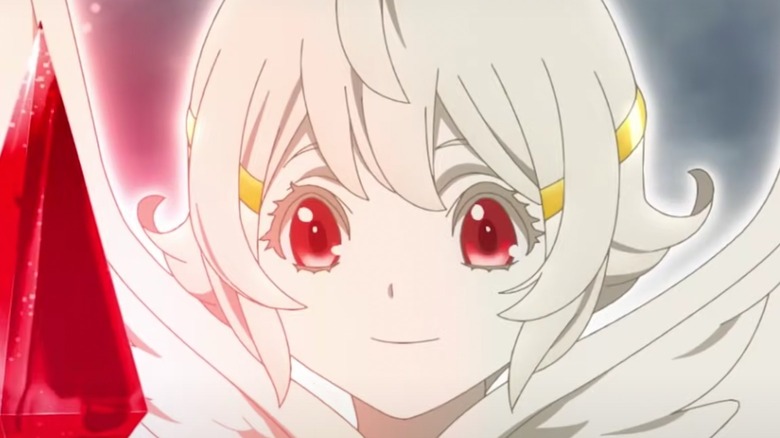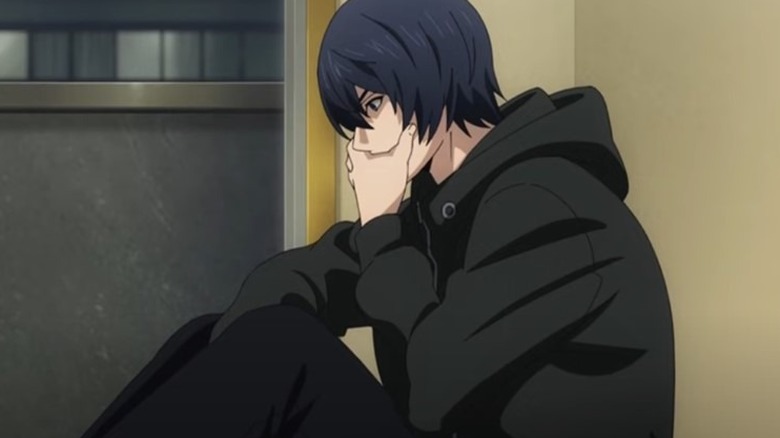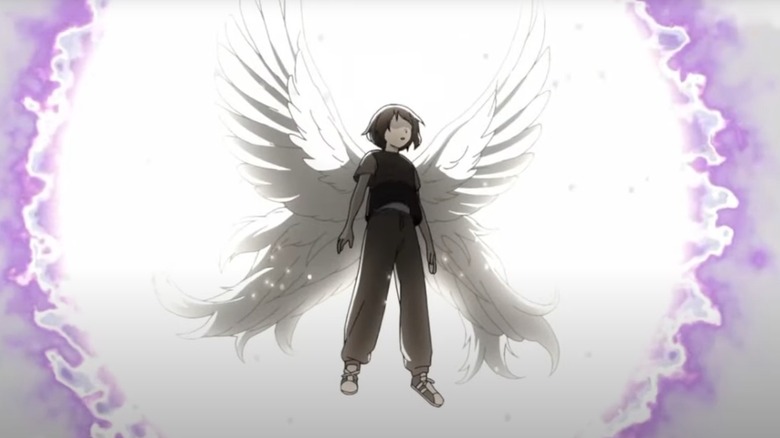The Ending Of Platinum End Explained
The following article includes discussions of suicide as well as spoilers about the conclusion of "Platinum End."
Fans of manga and anime that feature existential questions, unearthly influences, and surprising narrative twists likely found much to appreciate in the recently concluded anime series "Platinum End." Reuniting the creators of the acclaimed manga/anime "Death Note," the "Platinum End" manga grew out of the combined talents of writer Tsugumi Ohba and illustrator Takeshi Obata, with the story appearing in Jump Square magazine between 2015 and 2021 (via Anime News Network). Adapted for its 24-episode anime incarnation by Signal.MD, "Platinum End" subsequently aired from the Fall of 2021 to early 2022.
As the anime opens, viewers are introduced to teenage student Mirai Kakehashi, who's attempting to cope with a life that first makes him an orphan, then subjects him to ongoing abuse from his adoptive aunt and uncle. Pushed to the edge, literally, he finally feels he can't endure the situation any longer and leaps from a building. Rescued from his fate by the angel Nasse and given super-human powers, he then finds himself thrown into a supernatural contest with 13 other humans, each battling to become the new God once the current deity steps down. But as the series finishes up, the story takes a dark, unsettling, and even confounding turn.
With the series' unexpected conclusion leaving more than a little room for interpretation, let's explore what the closing chapter of "Platinum End" might mean.
How does the series set up its shock ending?
As the action of "Platinum End" accelerates toward its positively stunning denouement, we find the series' original protagonist Mirai Kakehashi has in fact not won the sometimes-ruthless competition to become the new God. Instead, along with the other losing contestants — at least, those not killed during the contest — he lives on, falls in love, and gains a new appreciation for simply being alive. The same generally holds true for the other surviving God candidates, who also return to an earthly existence. So at this point in the series, it seems the story is setting us up to believe the characters have reached the equilibrium of living their normal, day-to-day lives.
As it turns out, however, the contestant who ends up as the one human selected to reign over all of humanity's future is the dour, depressive young boy who has been watched over and guided by the angel Ogaro: Shuji Nakaumi. Also an orphan, Shuji is revealed as someone who believes that if a person wishes to die strongly enough, they should be allowed to take their own life. In fact, he helped his parents and grandfather to do just that earlier in the story. And as the newly ascended God, Shuji will carry this grave impulse to its logical end-point, dying by suicide himself in the finale, and in the process, causing all other life to also vanish — including the angels and every human being on Earth.
If you or anyone you know is having suicidal thoughts, please call the National Suicide Prevention Lifeline at 1-800-273-TALK (8255).
The Platinum End finale offers a dark take on life, death, and God
As detailed in an article on OtakuKart, the daunting complexities of the narratives spun by Tsugumi Ohba and Takeshi Obata often result in a layered story architecture where things are not always as they appear.
The article points out that "Ohba and Obata's stories are never fed on a silver spoon. One needs to read between the lines to understand the true meaning." It goes on to explain that "Platinum End" follows this creative duo's modus operandi, first easing the reader into the story by giving the characters their initial personas, but then imbuing the various players with something more psychologically-nuanced, so that "...as the story progresses, each of these characters acts as a personification of the different perspectives within a human mind."
And in Shuji Nakaumi's case, that perspective belongs to a now all-powerful being who views the voluntary ending of one's life as not only a possibility, but as a simple fact of existence – i.e., that people who want to die will always find a way to achieve that wish. In the end, that wish also becomes Shuji's final desire as well, leading him to terminate the existence of all life on the planet.
As far as explaining the lethal cosmic finale of "Platinum End," two possible meanings come to mind: humanity simply cannot exist without God, or conversely, God is a human creation, therefore — no humanity, no God. Either way, it's a melancholy conclusion to a thought-provoking series from a pair of genuine manga masters.
If you or anyone you know is having suicidal thoughts, please call the National Suicide Prevention Lifeline at 1-800-273-TALK (8255).


